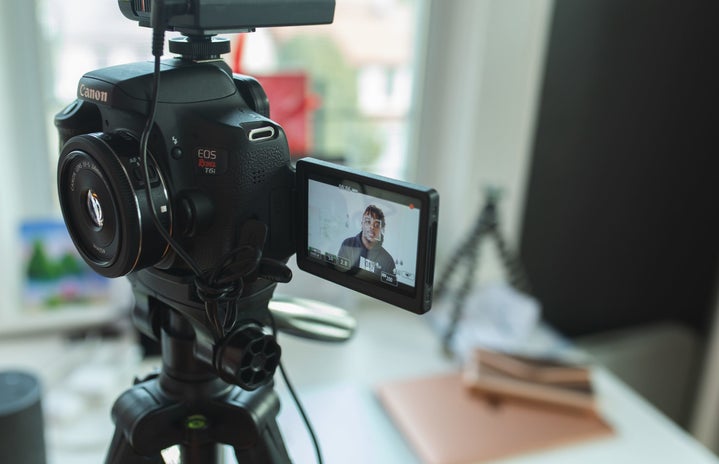For the past few years, making YouTube videos has become a very popular source of income and for gaining popularity by reaching a public of different ages, countries, and interests. That’s why there are all types of YouTubers. Among the most popular categories, one can find gamers, health + fitness vloggers, travelers, beauty gurus, and lifestyle coaches. How they monetize their videos varies and even though this has allowed many YouTubers and influencers to obtain a source of income unconventionally, they often say people don’t consider making YouTube videos a “real” job and here’s why I believe that way of thinking comes about.
Videos?
When we think of a “normal” job, many of us might think of a 9-to-5 office or corporate job, but posting photos and videos? Not so much, unless you’re a professional photographer or videographer.
We have taken something from our everyday lives, like capturing photos and videos, which we take for fun, for our entertainment, and to document experiences to treasure as the years go by, and have turned it into a business for popularity and gains (in subscribers, viewers, and money).
The thing about these YouTube videos and pictures, and how they stand out from those we take in everyday life, is that they can be in any space like a bedroom or the street, and about any topic. Not to mention, most of them are scripted and planned. Youtubers manage to explore their everyday lives, these are known as vlogs, or even eat loads of food and talk in front of the camera, known as a Mukbang, and monetize these videos (in different ways) by putting them online and creating a “fanbase.”
While this uncommon job can take place in the comforts of home while managing a variety of things, others in a 9-to-5 job have to devote many hours in the same space and doing specific tasks for other people. That’s what has been known as normal, acceptable, and for some, desirable in comparison to creating YouTube videos.
Schedule
Going back to what I mentioned earlier, many traditional jobs are usually 9 to 5 and that’s an established schedule. Unfortunately, people who have that kind of job don’t have the freedom or the time to do other things they may like because they spend most of their day at work, then in traffic, home to probably cook, and finally rest. On the other hand, YouTubers have the freedom to design their work schedule because they work for themselves. They can do their work whenever they want as they establish their deadlines and decide what they want to work on. Who wouldn’t want that freedom and flexibility? Yet, it’s not a reality for many.
Social Media
YouTubers and social media influencers’ businesses depend a lot on how many subscribers, followers, and viewers they have, plus their engagement with their audience. So, it pretty much depends on how much you’re liked and how many people resonate with your content, or what you post online.
People that have other forms of work don’t have that pressure because their work doesn’t rely on their personal or online life, aesthetic, followers, or content. Therefore, being social media a way to connect with others, have fun, post things you want, as well as like and support others’ content, may seem effortless and not that big a deal, but many YouTubers may argue that we don’t know what happens “behind the scenes.”
Events
Many YouTubers and influencers attend events hosted by brands and companies for marketing whatever product the company has and also for networking. Contrary to other jobs, which also have events, but for their employees to socialize and take a break from work, YouTubers go to these events mostly to network, meet other influencers and brands to collaborate with, which brings the possibility to grow their channel and obtain a greater income. Not to mention, they receive free things which they’ll possibly mention in their Youtube channel, thus promoting the company they received a product from.
Salary
While many “regular” jobs have an established salary, in which you get paid the same amount every 15 days, month, or have an hourly rate, YouTubers can determine how much they’re going to get paid.
Youtube pays them a certain amount based on their viewers, but the real money comes from all the AdSense (ads) we see on each video, brand deals sponsorships on Instagram posts and stories plus Youtube videos, affiliate links from companies when YouTubers link some of their products in their bio, and any additional product or business they create like podcasts, books, make-up or skincare lines, vitamins, clothing, etc.
The exact amount depends on what both parties agree upon and document on their contracts, which many don’t reveal. Again, people whose mentality is centered on a 9 to 5 and stable salary with no negotiation unless it’s a raise, wouldn’t see this as normal or real, let alone attainable.
Stability and benefits
Making youtube videos is not a stable job. Some videos may perform well while others don’t. Some videos may be promoted by Youtube and have more views, while others aren’t. At the same time, YouTube and social media might be at their peak now and with time, disappear, or stay for a very long time. Not to mention, being self-employed doesn’t grant you health insurance or a stable salary, making it very unpredictable and not 100% reliable. Too many people used to have that stability, this can sound terrifying, thus not considering it a real and sustainable business. Yet, other benefits can come out of it, like creating a personalized schedule, receiving free products, and working from home, as I mentioned before and others, like traveling for free.
Quote unquote
Lastly, and it’s what I believe has the most impact and what I find most interesting, is that the same YouTubers and social media influencers who often get frustrated by the fact that many people don’t take what they do seriously are the same people who often do air quotes at the word “job,” “career,” “work,” and other related terms when they talk about what they do and repeatedly refer to other forms of work as “normal” or “real.” The way I see that gesture is as if they don’t consider what they do a job, so why should other people? I mean, if you don’t respect or give value to what you do, how can you expect others to do so?
I get what Mark Twain said, “Find a job you enjoy doing, and you will never have to work a day in your life,” and perhaps many of them refer to this statement because they love what they do so much, as many expresses. It might also be because they want to appear relatable, more attainable (contrary to celebrities), so they downplay what they do, straying away from terms like famous and influencers, which they are, and call themselves “content creators.” However, downplaying it is causing that lack of acceptance towards what they do as a “real job.” That’s why respect and validation should come from ourselves as we teach others about what we do.
Making videos, having the freedom to make your schedule, attending networking-social events, posting sponsored photos, and being able to determine your salaries are all positive and unconventional ways to make a living nowadays. It breaks the mold of what’s considered the “normal” and common way to do so.
On the surface, it may look superficial, simple, effortless, and more like a hobby rather than a job, but a YouTuber’s state is much more than that and it goes far beyond what we see on camera. Since we don’t know what goes on behind the cameras, we should be taught to understand and respect it. That’s the reason I stand by what I said earlier, that if YouTubers and social media influencers don’t respect their work by using affirmative terms, eliminating the air quotes, and downplaying the way they make a living, they can’t expect others to understand and do the same.



